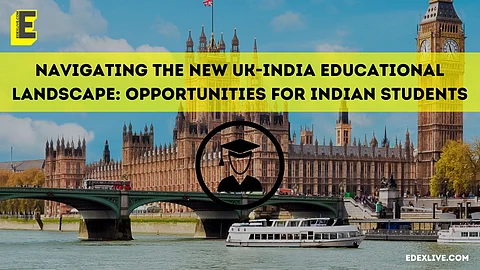

The educational links between the United Kingdom (UK) and India have strengthened significantly in recent years, resulting in incredible opportunities for Indian students. The UK has positioned itself as a more attractive higher education destination by introducing progressive policies, scholarships, and visa reforms.
This evolving landscape offers Indian students access to the world’s best universities, state-of-the-art research, and promising career prospects.
UK-India educational collaboration: A strengthening bond
The UK and India have had a tradition of academic cooperation for many years. The India-UK Enhanced Trade Partnership, which was signed in 2021, has added a new dimension to educational cooperation. Nowadays, the UK government is behind programs allowing Indian students to study in the UK and work there.
According to the UK Home Office agency records, there was a 54% increase in the number of Indian students who were granted UK student visas in 2022.
The total number of these students has reached over 140,000. India is currently the largest among all student visas with a percentage of 41%, and most likely, Indian students have decided to gain higher education in the UK.
Key opportunities for Indian students
1. Increased scholarships and financial support
Affordability is one of the main concerns for Indian students studying abroad. The UK government and various universities offer scholarships specifically designed for Indian students. Some key scholarships include:
•Chevening Scholarships – Fully funded scholarships covering tuition and living expenses.
•Commonwealth Scholarships – Fully funded postgraduate scholarships for students from developing Commonwealth countries.
•GREAT Scholarships – An initiative by UK universities providing financial support to Indian students in various subjects.
Additionally, Indian banks and financial institutions offer low-interest education loans, further supporting students' academic journeys.
2. Post-study work opportunities
The reintroduction of the Graduate Route Visa allows Indian students to stay in the UK for two years (three years for PhD graduates) after completing their studies.
This policy provides valuable work experience and increases employment prospects, enhancing students’ international exposure and skill development.
3. The rise of joint degree programmes
UK universities have been in association with Indian institutions, which provides a dual degree program to the students to complete an internship in the UK and part of the program in the motherland.
The collaboration between IITs and UK universities allows student exchange programs, research partnerships, and dual-degree options at a lower cost than typical education, which still gives students global exposure.
4. Emerging fields and industry demand
The UK is the world leader in new technologies; example, it has the best artificial intelligence, cyber security, fintech, biotechnology, and environmental sciences. In the same way, the UK-India Tech Partnership enables students to benefit from the latest R&D facilities, research, a vast network, and partnerships with companies.
These Indian students who specialise in STEM fields, business analytics, and data science are highly sought after among UK employers. Based on: UK-India Tech Partnership Report, 2023.
Navigating visa and immigration policies
For an Indian student willing to study in the UK, knowing the visa laws and regulations is very important. The Student Route Visa remains the main route, which advocates that students should have a Confirmation of Acceptance for Studies (CAS) from a UK university.
The UK-India Young Professionals Scheme, initiated in 2023, is an excellent opportunity for young professionals who, under the scheme, will be provided a two-year work visa for 3,000 young Indian professionals yearly, which will lead to a significant improvement in post-study employment prospects.
In addition, the UK has eased the visa application process, and new services, such as premium and ultra-premium services, have been offered to Indian applicants. This year, the visa approval rate for Indian students has reached 96%, which is confirmation of the successful performance by the Indian branch.
(Shayon Das Verma is the Head Of marketing Vita Student, INDIA MENA and SEA. Views expressed are their own.)
